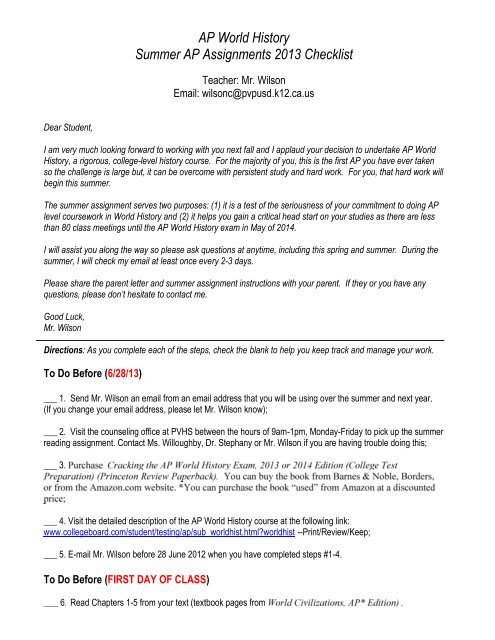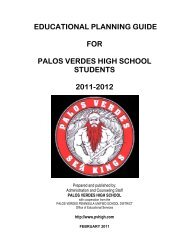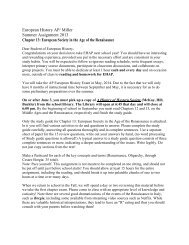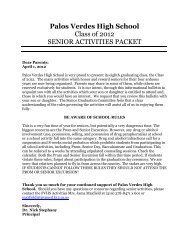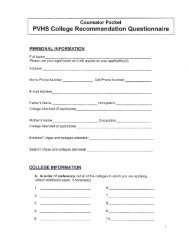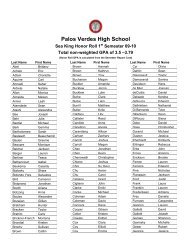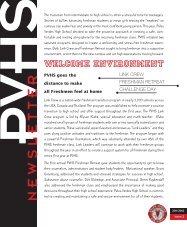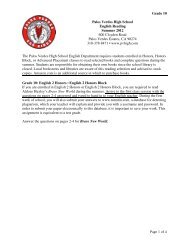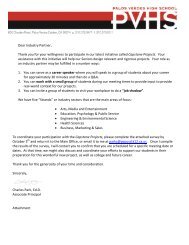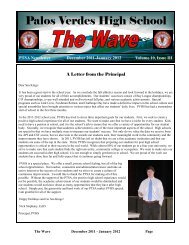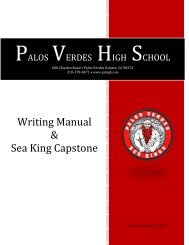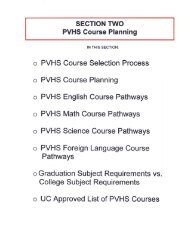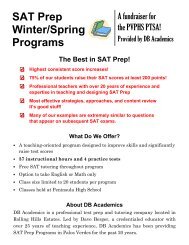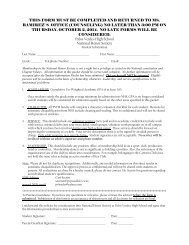AP World History Summer AP Assignments 2013 Checklist
AP World History Summer AP Assignments 2013 Checklist
AP World History Summer AP Assignments 2013 Checklist
You also want an ePaper? Increase the reach of your titles
YUMPU automatically turns print PDFs into web optimized ePapers that Google loves.
<strong>AP</strong> <strong>World</strong> <strong>History</strong><br />
<strong>Summer</strong> <strong>AP</strong> <strong>Assignments</strong> <strong>2013</strong> <strong>Checklist</strong><br />
Teacher: Mr. Wilson<br />
Email: wilsonc@pvpusd.k12.ca.us<br />
Dear Student,<br />
I am very much looking forward to working with you next fall and I applaud your decision to undertake <strong>AP</strong> <strong>World</strong><br />
<strong>History</strong>, a rigorous, college-level history course. For the majority of you, this is the first <strong>AP</strong> you have ever taken<br />
so the challenge is large but, it can be overcome with persistent study and hard work. For you, that hard work will<br />
begin this summer.<br />
The summer assignment serves two purposes: (1) it is a test of the seriousness of your commitment to doing <strong>AP</strong><br />
level coursework in <strong>World</strong> <strong>History</strong> and (2) it helps you gain a critical head start on your studies as there are less<br />
than 80 class meetings until the <strong>AP</strong> <strong>World</strong> <strong>History</strong> exam in May of 2014.<br />
I will assist you along the way so please ask questions at anytime, including this spring and summer. During the<br />
summer, I will check my email at least once every 2-3 days.<br />
Please share the parent letter and summer assignment instructions with your parent. If they or you have any<br />
questions, please don’t hesitate to contact me.<br />
Good Luck,<br />
Mr. Wilson<br />
Directions: As you complete each of the steps, check the blank to help you keep track and manage your work.<br />
To Do Before (6/28/13)<br />
___ 1. Send Mr. Wilson an email from an email address that you will be using over the summer and next year.<br />
(If you change your email address, please let Mr. Wilson know);<br />
___ 2. Visit the counseling office at PVHS between the hours of 9am-1pm, Monday-Friday to pick up the summer<br />
reading assignment. Contact Ms. Willoughby, Dr. Stephany or Mr. Wilson if you are having trouble doing this;<br />
___ 3.<br />
___ 4. Visit the detailed description of the <strong>AP</strong> <strong>World</strong> <strong>History</strong> course at the following link:<br />
www.collegeboard.com/student/testing/ap/sub_worldhist.htmlworldhist --Print/Review/Keep;<br />
___ 5. E-mail Mr. Wilson before 28 June 2012 when you have completed steps #1-4.<br />
To Do Before (FIRST DAY OF CLASS)<br />
____ 6. Read Chapters 1-5 from your text (textbook pages from .
___ 7. After reading each chapter, you will need to complete a chapter “key terms list”, in which you will define<br />
and provide significance for all bolded / italicized terms in your chapter. In your definitions, you will need to<br />
provide: the “who” (persons, groups, parties, dynasties, etc.); the “what” (ideas, events, use, conflicts, etc.); the<br />
“when” (specific dates); and the “where” (region, country, city, etc.). For the significance, you will need to address<br />
the “how” and “why” (cause & effect). Each key term should be about 4-6 sentences in length. Title: Key Terms<br />
Chapter xx.<br />
___ Chapters 1-5 Reading / Key Term Lists Completed<br />
___ 8. Complete the SGRQ’s (study guide review questions) at the end of this list. Make sure your answers are<br />
thorough. Include names, dates, events, etc. Responses should be about 6-8 sentences in length. Title: SGRQ’s<br />
Chapter xx.<br />
___ Chapters 1-5 Study Guide Review Questions Completed<br />
___ 9. After you have read, completed the key terms and SGRQ’s for each chapter, go to the online learning<br />
center to complete: (A) the multiple choice quiz; (B) the true/false quiz; (C) the short answer quiz for each<br />
chapter. Each quiz has about 10 questions that you will answer (of course you can use your notes and text to<br />
help you). You will not be graded on these quizzes but I expect you to take advantage of this self-check<br />
exercise—it is a great tool to help you gauge whether or not you are able to comprehend the main ideas of each<br />
chapter. The website is<br />
http://wps.ablongman.com/long_stearns_wcap_4/18/4646/1189431.cw/index.html<br />
Directions: Click on the chapter you are working on (you can use the pull-down menu or select the chapter from<br />
the menu on the left-hand side), 2. Select “Multiple Choice, True/False or Short Answer” (complete all three).<br />
Click “submit” for immediate feedback / answers.<br />
___ Chapters 1-5 (Multiple Choice, T/F, and Short Answer) Tests Completed<br />
___ 10. Acquire the following materials for class:<br />
A 3 inch 3 ring binder to contain handouts, notes, course materials, and outside readings<br />
loose leaf paper<br />
section dividers (5)<br />
<strong>AP</strong> <strong>World</strong> <strong>History</strong> Prep Books/Materials – a brief listing of preparation guides that you might like to have to help<br />
you study this coming year (in no particular order):<br />
1. Kaplan <strong>AP</strong> <strong>World</strong> <strong>History</strong> <strong>2013</strong> (or 2014 if it’s recently been published)<br />
2. 5 Steps to a 5 in <strong>AP</strong> <strong>World</strong> <strong>History</strong>, <strong>2013</strong>-2014 Edition.<br />
3. Barron's <strong>AP</strong> <strong>World</strong> <strong>History</strong>, Newest Edition<br />
4. Barron’s<br />
*Though helpful, these textbooks are not mandatory.
Chapter 1 Study Guide Review Questions<br />
1. Describe what enabled civilizations to develop.<br />
2. Identify the characteristics that are critical for a society to become a civilization.<br />
3. Compare the drawbacks of non-civilized societies with civilized societies.<br />
4. Compare the advantages of an agriculturally based society with a hunter-gatherer society.<br />
5. Evaluate the significance of Jewish monotheism in the religious history of early civilization.<br />
6. Compare the main features of Egyptian and Mesopotamian civilizations. What did the two civilizations<br />
have in common as early civilizations What were their main differences in values and organizations<br />
Chapter 2 Study Guide Review Questions<br />
1. Evaluate the strengths and weaknesses of classical Chinese society.<br />
2. Trace the rise of Confucianism.<br />
3. Identify the ways that Confucian philosophy supported the political structure in China.<br />
4. Summarize why bureaucracy developed in classical China.<br />
5. How was China able to accept two major belief systems, Confucianism and Daoism<br />
Chapter 3 Study Guide Review Questions<br />
1. Trace the patterns of early Indian history.<br />
2. Assess the influence of Indian culture on the rest of the world.<br />
3. Trace the development of the caste system.<br />
4. Compare Buddhism and Hinduism.<br />
5. What features of Indian and Chinese geography help explain each area’s social patterns<br />
6. Compare the caste system with the organization of Chinese and Greek society.<br />
7. Compare the political implications of Hinduism and Confucianism.<br />
8. Compare the family structures of India and China.<br />
Chapter 4 Study Guide Review Questions<br />
1. Compare Greek and Roman political structures.<br />
2. Evaluate the significance of the Hellenistic period in Asian and African history.<br />
3. Compare the main political, social, and economic features of the Roman Empire and Han China.<br />
4. Assess how and why the Indians developed long-lasting polytheistic religions but the Greeks did not.<br />
5. Compare the scientific achievements and approaches of classical India, China, and the Mediterranean.<br />
6. Compare the political philosophical thoughts of the Greeks and the Chinese.<br />
Chapter 5 Study Guide Review Questions<br />
1. Evaluate the effect on societies of the fall of the classical civilizations.<br />
2. Compare the rise of civilization in the Americas and in Polynesia.<br />
3. Compare the eastern and western portions of the Roman Empire.<br />
4. How can it be argued that the Roman Empire did not really “fall” in 476 C.E.<br />
5. Compare the factors in the decline of the classical civilizations.<br />
6. Compare the main features of the civilizations of Kush, Axum, and Ethiopia.


